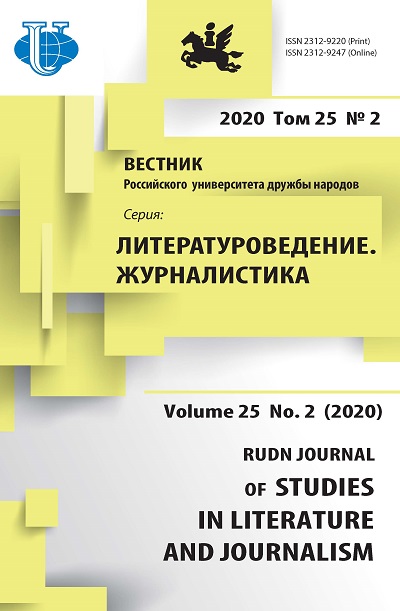Риторическая модель коммуникации в сочинении древнерусского книжника «Слово некоего калугера о чтении книг»
- Авторы: Ильичева В.В.1
-
Учреждения:
- Российский университет дружбы народов
- Выпуск: Том 25, № 2 (2020)
- Страницы: 334-340
- Раздел: Журналистика
- URL: https://journals.rudn.ru/literary-criticism/article/view/24302
- DOI: https://doi.org/10.22363/2312-9220-2020-25-2-334-340
- ID: 24302
Цитировать
Полный текст
Аннотация
В статье рассматривается риторическая модель коммуникации в сочинении неизвестного автора «Слово некоего калугера о чтении книг», включенного в один из древнейших сборников рукописей Изборник 1076 года, в плане его спецификации относительно риторической коммуникации. В коммуникативном направлении предметом данной модели выступает коммуникативно-риторическая деятельность человека как субъекта, действующего словом, и читателя, на которого направляется воздействие «Слова». Анализируются основные компоненты риторической модели коммуникации: коммуникативный контекст, образ автора, образ аудитории, ситуативно ориентированный, риторически обработанный текст. Это первое в истории русской культуры сочинение о пользе, методах и целях чтения. Особенность составления текста в «Слове» заключается в переосмыслении автором Священного Писания, наличии неканонических мотивов, преобладании практических рекомендаций над теоретическими, что свидетельствует об эволюции образа автора в риторике.
Об авторах
Валерия Владимировна Ильичева
Российский университет дружбы народов
Автор, ответственный за переписку.
Email: lera_ilyicheva@mail.ru
кандидат филологических наук, старший преподаватель кафедры массовых коммуникаций филологического факультета
Российская Федерация, 117198, Москва, ул. Миклухо-Маклая, д. 10, корп. 2Список литературы
- Турилов А.А. Изборник 1076 года. URL: http://www.pravenc.ru/text/293836.html (дата обращения: 13 февраля 2020 г.).
- Мещерский Н.А. О некоторых источниках «Изборника 1076 г.» в связи с вопросом о происхождении их переводов // Культурное наследие Древней Руси: истоки, становление, традиции. М., 1976. С. 34-38.
- Мильков В.В. Никифор и древнерусская мысль. URL: http://krotov.inf/history/12/3/ milkov1.html (дата обращения: 13 февраля 2020 г.).
- Творогов О.В. Изборник 1076 г. // Словарь книжников и книжности Древней Руси. Вып. 1. XI - первая половина XIV в. Л., 1987. С. 196-198. URL: http://lib. pushkinskijdom.ru/Default.aspx?tabid=3973 (дата обращения: 13 февраля 2020 г.).
- Изборник 1076 года / изд. подг. В.С. Голышенко, В.Ф. Дубровина, В.Г. Демьянов, Г.Ф. Нефедов. М., 1965.
- Лихачев Д.С. Назначение Изборника 1076 г. URL: http://odrl.pushkinskijdom.ru/ LinkClick.aspx?fileticket=4fWZVRtHpnI%3D&tabid=2290 (дата обращения: 13 февраля 2020 г.).
- Розов Н.Н. Как «сделана» вступительная статья Изборника 1076 года // Культурное наследие Древней Руси. М., 1976. C. 42-46.
- Розов Н.Н. Старейшая русская книга для чтения. URL: http://www.literary.ru/readme. php?subaction=showfull&id=1500754718&archive=&start_from=&ucat=& (дата обращения: 13 февраля 2020 г.).
Дополнительные файлы















